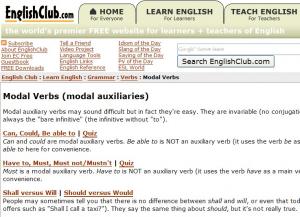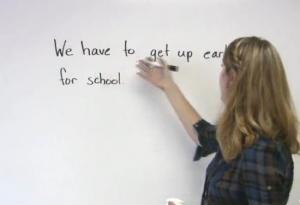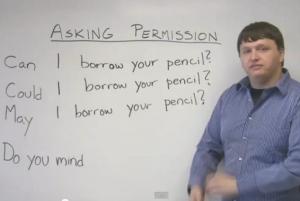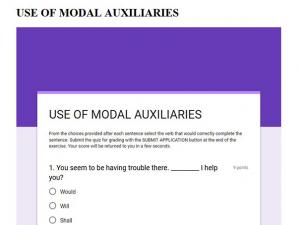This lesson teaches how to use "can" to ask permission. Can I come in? There are also three activities to practice the helping verbs, do, does and can. In each activity there is a dialogue to complete. There is a lot of practice in this excellent lesson.
-
Category:Status: PublishedUpdated date: Thu, 03/16/2017 - 02:46
-
The modal verbs "could" and "should" are similar. Which is stronger? What is the meaning of these modal verbs? An excellent lesson that describes what is different when a speaker uses these words.
Category:Status: PublishedUpdated date: Thu, 12/15/2011 - 02:09 -
This page explains how to use modal verbs "must not" and "do not have to". Includes an exercise.
Category:Status: PublishedUpdated date: Thu, 12/15/2011 - 02:23 -
Learn how to talk about things you are not sure about in English using "may", "might" and "maybe. In this beginner English lesson you will see two friends trying to decide what to wear to a party. You will learn how to use "may" and "might" to express things that may happen but that are not certain.
Category:Status: PublishedUpdated date: Thu, 12/15/2011 - 02:24 -
If you want to understand the difference in meaning between “should” and “must,” you should check out this free grammar lesson! After you have watched the class, you should take the free quiz below to test your understanding.
Category:Status: PublishedUpdated date: Thu, 12/15/2011 - 06:54 -
Watch the video of Sophie discovering some unusual Indonesian food then complete the exercises to see how the modal verbs might, may and could + an infinitive form without 'to' can be used when we think it is possible something is true.
Category:Status: PublishedUpdated date: Mon, 09/15/2014 - 03:10 -
Learn about expressing activities you must do using the present tense of "have to" in this simple grammar video lesson.
Category:Status: PublishedUpdated date: Thu, 12/15/2011 - 02:04 -
This video discusses the usage about "can", "could" and "be able to." It includes an interactive quiz at the end of the video.
Category:Status: PublishedUpdated date: Thu, 12/15/2011 - 07:00 -
Do you always know when to use 'make' or if you need to use 'do'? Try out these 20 questions and see how many you get right. Complete the sentences by filling in the gaps with either 'make' or 'do'. But remember, you need to make sure you are using the right tense (past of present) as well!
Category:Status: PublishedUpdated date: Fri, 10/24/2014 - 07:32
-
This video talks how to express preferences using PREFER, WOULD PREFER, and WOULD RATHER.
Category:Status: PublishedUpdated date: Thu, 12/15/2011 - 02:10 -
Learn how to use modal verbs to form the future tense in this video. Make sure to move on to Part 2 of this lesson when you're done!
Category:Status: PublishedUpdated date: Fri, 11/01/2013 - 16:31 -
We use the modal verbs can, could and would to offer to do things for people or to invite them to do something. We also use them to make requests or ask permission to do something. This a great resource to learn and understand modal verbs and practice using them.
Category:Status: PublishedUpdated date: Wed, 07/22/2015 - 23:33 -
Learn how to use modal verbs to create the future tenses as you watch this video. Be sure to watch Part 1 of this lesson!
Category:Status: PublishedUpdated date: Fri, 11/01/2013 - 17:04 -
This list of 8 modal verbs links to a list of each of their uses, with examples. Click the links and you can see the details.
Category:Status: PublishedUpdated date: Tue, 12/13/2011 - 06:50 -
Could, should, be able to, have to, must; these are all examples of modal verbs. If you need more practice with modal verbs, this link has quizzes and lessons.
Category:Status: PublishedUpdated date: Tue, 12/13/2011 - 14:49 -
This page lists several common modal verbs - like must, can, may and need - along with their possible substitutes. There are a few exercises for you to practice your knowledge of these modals. The exercises will tell you if you got the answers right or wrong.
Category:Status: PublishedUpdated date: Thu, 12/15/2011 - 02:39 -
How do you express actions that you must or must not do? There are several ways and this video lesson covers the use of modal verbs of obligation like 'must', 'have to' and 'should' with lots of interactive oral exercises at the end of the video.
Category:Status: PublishedUpdated date: Thu, 12/15/2011 - 07:02 -
Learn how to use modal verbs like "should", "might" and "would" to discuss market trends at work. In this advanced English lesson you will watch colleagues discussing the sales figures and market evolution in their business. You will learn some common vocabulary for discussing sales and marketing trends.
Category:Status: PublishedUpdated date: Thu, 12/15/2011 - 07:15 -
Learn the subtle differences between "must" and "have to," and "mustn't" and "don't have to." This English grammar lesson will explain how to use these terms in the past, present and future tenses.
Category:Status: PublishedUpdated date: Thu, 12/15/2011 - 07:38 -
Politeness, formality, and necessity are all important parts of asking permission. This video lesson explains how CAN, COULD, MAY, and DO YOU MIND can all be used to ask permission in English, with different effects.
Category:Status: PublishedUpdated date: Wed, 01/11/2012 - 01:59 -
In this beginner English lesson you will learn how to use "can" and "could" to ask and answer simple questions about what is possible. You will see people discussing meals and menus on the phone using these verbs.
Category:Status: PublishedUpdated date: Mon, 01/16/2012 - 04:30 -
Where is your best friend right now? Why is the bus late? Learn to talk about possibility and speculation in the present! Here, you will learn how to use “must,” “have to,” “might,” “may,” and “could” for speculation. You will want to check out this lesson if you are interested in improving your English.
Category:Status: PublishedUpdated date: Mon, 02/06/2012 - 02:39 -
In this English lesson, the teacher teaches you how to give advice, using 'should', 'ought to', and 'had better'. These are used differently and can mean different things. Learn about those differences here!
Category:Status: PublishedUpdated date: Mon, 02/13/2012 - 11:34 -
A list of modals and their contracted forms. Also includes notes on usage.
Category:Status: PublishedUpdated date: Thu, 12/15/2011 - 02:54 -
In English, modals are used to express possibility, permission, and also advice. In this lesson you will learn which modals show advisability and how to use them!
Category:Status: PublishedUpdated date: Thu, 12/15/2011 - 06:48 -
Learn the difference between "must" and "have to" in this video lesson. Your English will sound more natural!
Category:Status: PublishedUpdated date: Mon, 10/28/2013 - 18:46
-
This video describes how to use modal verbs to express possibilities in the past.
Category:Status: PublishedUpdated date: Thu, 12/15/2011 - 01:36 -
Although the "may" and "might" is similar, there are some subtle differences. Listen the audio with transcript and you can find the answer.
Category:Status: PublishedUpdated date: Fri, 09/27/2013 - 09:39 -
A modal auxiliary verb gives information about the function of the main verb that it governs. From the choices provided after each sentence select the verb that would correctly complete the sentence and test your understanding of these types of verb.s
Category:Status: PublishedUpdated date: Thu, 09/07/2017 - 01:25 -
This English grammar class shows how the future tense of ‘will’ can teach you everything you need in order to understand modals. If you know the future tense very well, this technique will help you understand modal verbs like can, could and might.
Category:Status: PublishedUpdated date: Thu, 12/15/2011 - 03:29 -
The word 'should' doesn't follow the normal rules in English, when used in the past tense. In this grammar lesson, it explains how to use 'should' in the past tense to form sentences like "I should have watched the lesson!"
Category:Status: PublishedUpdated date: Thu, 12/15/2011 - 06:47
-
Excellent resource for learning and practicing the use of modal verbs in the past, present and future to express certainty, advice, permission and more.
Category:Status: PublishedUpdated date: Mon, 09/01/2014 - 04:37 -
Learn about how to use the past tense and modals to talk about hypotheses (things we might imagine) and wishes. There's a self-checking quiz for you to practice how much you learned!
Category:Status: PublishedUpdated date: Thu, 12/15/2011 - 07:27
Level
|
Elementary
Lower Intermediate
Intermediate
|
Upper Intermediate
Advanced
Multiple Levels
|
Editor's rating
|
Extraordinary
Highly Recommended
Recommended
|
Fair
Functional
|

































